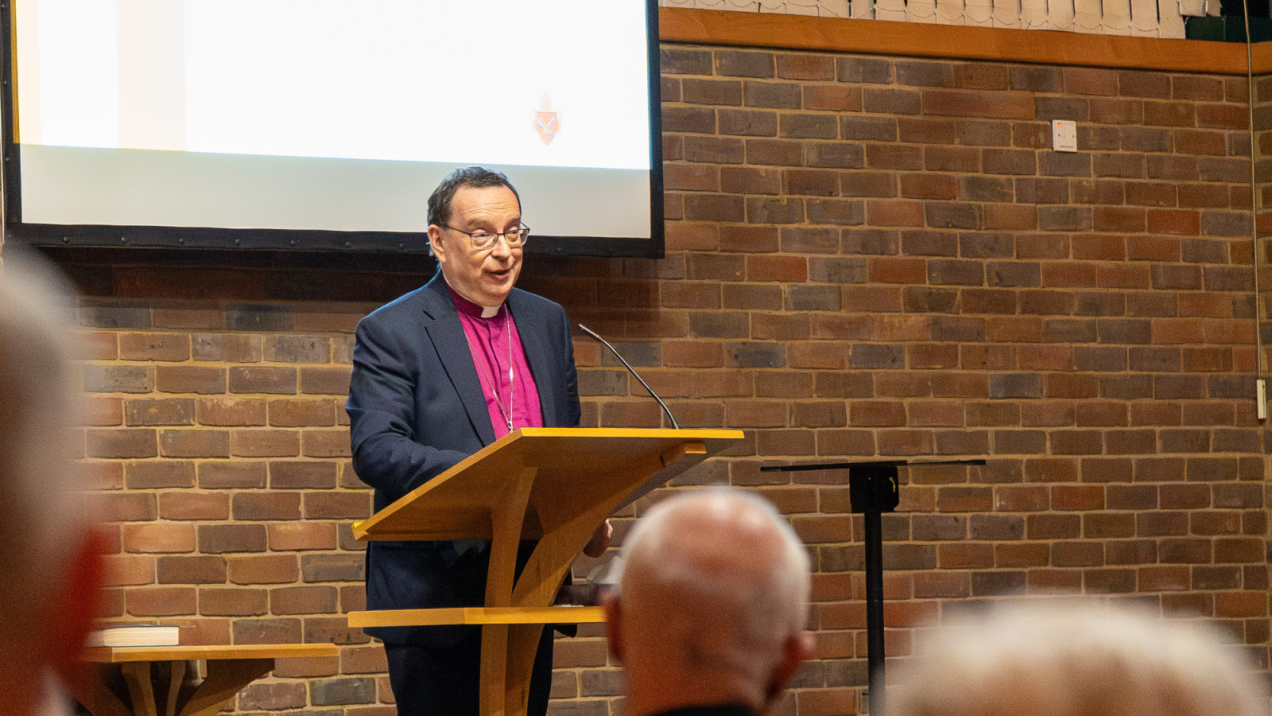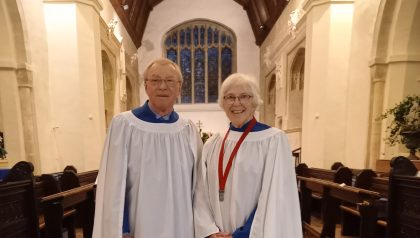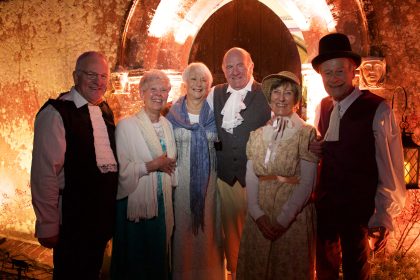On 14 November, Bishop Philip gave the Presidential Address at Diocesan Synod, reflecting on a passage from the Book of Revelation and how the themes of suffering, the Kingdom and patience endurance are particularly relevant for our diocese in this moment.
Very near the start of the Book of Revelation we find some words which I’ve always found arresting. This is how the Apostle John describes himself to his readers: I, John, your brother and companion in the suffering and kingdom and patient endurance that are ours in Jesus. Let me repeat it: I, John, your brother and companion in the suffering and kingdom and patient endurance that are ours in Jesus.
The words seem to me to encapsulate the very essence of Christian discipleship. For us to be Christians is to be companions together – and to be companions together with Jesus – in suffering. We are all called to take up our cross and to follow him. Christian discipleship is not a rest cure, or a ticket to an easy life.
And yet we are also companions together in the Kingdom. We follow the King, the risen one, and we are citizens of his Kingdom, which is the most joyful thing imaginable.
And because we walk in the way of suffering as we head towards the Kingdom that is coming, and the foretaste of which we enjoy now, we endure patiently. Eugene Peterson described Christian discipleship as ‘a long obedience in the same direction’ – and that is what we are called to. We patiently endure as we live for and work for the Kingdom that is to come.
And it’s through those three lenses – of suffering, of the Kingdom, and of patient endurance – that I want to report on the life of this diocese to this Synod.
So let us start with suffering. We must of course acknowledge the sad and tragic loss of Canon Gary Philbrick which happened after we last met. Gary’s death was unexpected and tragic. He gave us so much in this diocese and had so much more to give and we continue to grieve his loss. His funeral was astonishing, attracting around 2000 people even in August. ‘Be more Gary’ became something of a saying for us in the wake of his funeral, and we could not honour his memory better than by being more like him – in smiling readily, in good humour, in kindness, in generosity, in hopefulness and in faith. May he rest in peace and rise in glory. I’m also very grateful to Rev. Howard Jameson, Area Dean of Andover, for taking on Gary’s old role of Assistant Archdeacon of Winchester in the meantime
On a national level, as we think about suffering, I remain very concerned about the upcoming assisted suicide bill. I have never yet voted in the Lords, but I will on this issue. I appreciate we may not all share the same perspective on this, but it seems to me to be the most significant issue facing this country in many decades, and deserves, I believe, much fuller discussion and debate than a Private Member’s Bill in parliament can ever have. I would value your prayers for my speaking into that debate.
But we cannot leave the issue of suffering and the vulnerable without acknowledging, together, the appalling abuse that many people suffered in Morestead in this diocese at the hands of John Smyth: abuse which left physical scars that took a long time to heal, and mental scars that might never heal. And to say that this was done in the name of God is utterly appalling and a travesty of the truth and love that are found in Jesus Christ.
I want to make it abundantly clear to us all that safeguarding is everybody’s business: we must all be vigilant, and making disclosure of any abuse is not optional. We each and all of us have a clear moral duty to do so, and woe betide us, before God, if we do not.
I want to say too that my clear expectation is that all failures in safeguarding should be taken seriously and whether locally or nationally I would expect the response to those failures, and to those who make them, to be proportionate, appropriate and effective and made without fear or favour. Nothing less than that will do. Personally I am immensely sad that Archbishop Justin has had to resign, but equally I believe he has shown immense leadership in doing so and in shouldering the responsibility he has.
Finally, let me say that it matters that we are in this work of creating a safer church together in this diocese. I want to assure you that the Bishop’s Staff Team have been discussing an appropriate response to the revelations of the Makin Review and have already taken some action in that regard. Our excellent safeguarding team, our protocols, policies and practices, are there to help us, to help create a safer church, and – above all else, because this is close to Jesus’ heart – to protect the vulnerable amongst us. So let us give ourselves willingly and unhesitatingly to that task.
So much for suffering. We will never leave it behind this side of glory, but let’s turn from it to the signs of the Kingdom we see amongst us. There are three signs in particular I wish to highlight.
The first is the wonderful service we had recently when Bishop David and I licensed or commissioned no fewer than 72 people for lay ministry in this diocese. That is a hugely hopeful sign, and great credit to members of our ministry team who work so hard with people preparing for such ministries.
One thing I noticed in particular in that service was the way some of those we were commissioning have already embarked on further training for other ministries, including ordained ministry. And that too is hugely encouraging. While numbers of candidates for ordination are low elsewhere in the country they are not here. We have a strong pipeline. We should thank God for that – and also recognise that one reason that is so, is that we do give people many different opportunities to step into some kind of recognised ministry – and long may that continue.
However, even that joyful day was tinged with sadness, and with suffering. We should have been licensing 73 people, not 72, but sadly Jane Nicholson, a candidate for LLM ministry died just days before the service. Very poignantly we presented her daughter Laura with the scarf and Bible Jane should have received. As I said at the service it reminds us that this is not a leisure activity we are engaged in. We really are brothers and sisters and companions in the suffering and kingdom and patient endurance that are ours in Jesus.
The second event that spoke to me so powerfully of the Kingdom of God that is both coming and present was the wonderful weekend when the Archbishop of Canterbury visited us. Notwithstanding subsequent events which I referred to earlier. It really was a very moving time. Archbishop Justin shared his own story with simplicity, conviction and humour and spoke eloquently and passionately of his own faith in Christ. And I know that a number of other events took place across our diocese, facilitated by members of the College of Evangelists. But it wasn’t just our visitors that impressed me! Time and again we visited local projects led by members of churches sharing the love of Jesus, often with people on the margins, with compassion, empathy and love, and we visited beautifully curated prayer hubs where people were praying faithfully for the weekend’s events.
Two of the events were put on especially, but most weren’t. We were simply joining in with things that were happening anyway, where the love of Jesus was shared in simple, loving ways. So in many ways I’d say the projects we visited, while being wonderful, were not exceptional – because sharing the love of Jesus in this way isn’t the exception at all. It’s normal: it’s what people all across this diocese do day in, day out. It is truly wonderful, and I’m so thankful for it.
So I do want to say a huge thank you to all those who involved in any way over this weekend, and in particular to the dream team of curates, Revs Clive Beard, Katie Hodkinson and Lorraine Kingsley, who masterminded the planning. But I also want to thank all of you for all you do in so many ways and in so many places across our diocese to share Jesus’ love. It delights my hearts. And I’m sure it delights his too.
And the third event I’d want to highlight is the wonderful consecration of Bishop Rhiannon which took place last month – and I’m delighted that Rhiannon is here with us tonight. It was a wonderful service, both beautiful and joyful and in itself a sign of the Kingdom.
But even more than the service, I’m delighted by Rhiannon’s appointment. The outcome of the interview was very clear to all of us involved, and I’m sure we will all be greatly blessed by Rhiannon’s gifts and energy and passion in the years to come. I have no doubt that it is God who has called her here. We will welcome her and Philip more formally on Saturday, but let’s all greet her now!
So from the suffering and the Kingdom let us turn to the third of that trio – to patient endurance. As I said earlier: because we walk in the way of suffering as we head towards the Kingdom, we endure patiently, in ‘a long obedience in the same direction’. We patiently endure as we live for, and work for, the Kingdom that is to come.
Under the heading of ‘patient endurance’ I do want to mention the news of Dean Catherine’s retirement. It’s maybe not the best heading for this news, but it is true that the Cathedral and Catherine have had to do a lot of patient enduring in recent months and some of the online comment both about her and the Cathedral has been deeply unkind and unfair. And that she has endured patiently. Notwithstanding the challenges of the last few months, however, I am immensely grateful to Catherine not only for the warmth of her personal welcome to me, since I arrived as bishop, but also for the excellence of the ministry she has exercised at the Cathedral, making it a place of generous hospitality and uplifting worship. I quite understand her personal reasons for going, but am only sorry we will not have had the opportunity to work together for longer. And I thank her very warmly on behalf of us all for all she has been and done amongst us and for our Cathedral and wish her and Robin all God’s richest blessings for their future in Yorkshire
Part of what it means to exercise a long obedience in the same direction is to have some clarity about what that direction might be. ‘Walking the Wessex Way’ is, as you know a story and vision for the diocese. It is deliberately not dictatorial but invitational. It draws on our significant heritage as a diocese, illustrates how it is inspiring people today, and invites us to think how that heritage of grace: of learning, serving, growing and loving might live in our own contexts today.
The task of making learning, serving, growing and loving evident falls mainly to our parishes, our chaplaincies and our schools. ‘Walking the Wessex Way’ does not try to tell them what to do: there is only so much change that can be leveraged centrally.
Nonetheless there are things that can and should be done from the diocesan ‘centre’. And the Bishop’s Staff Team have responded to the invitation of ‘Walking the Wessex Way’ by identifying areas where we can and should engage, on behalf of, and for the benefit of our parishes, our chaplaincies and our schools. So we are already taking action in a number of ways – or will be soon – in those areas which I outlined for you last time (and indeed the time before that!); in developing our models of ministry, lay and ordained; in better attending to clergy wellbeing; in resourcing ministry with children and young people; in attending to issues of diversity and equality such as gender, disability and racial justice; and in helping our parishes be more healthy and confident in mission.
That work is exciting and supported by some excellent research work in which we have been able to analyse some critical health and vitality indicators for all our parishes. And I very much hope it will form the basis of a big and ambitious bid which we will make to the Church Commissioners to support and see a step change in our work in these areas.
But we cannot simply look to others to support us in this work. Part of our patient endurance, part of our long obedience in the same direction, is to take seriously our own financial responsibilities and our CMF collection rates continue to be a matter of concern, so I do appeal to us all to be encouragers of responsible and committed giving in our own deaneries and parishes. If we seek the generosity of God, as we do, then we must be generous ourselves.
So where does this leave us? Well, after he has described himself as, your brother and companion in the suffering and kingdom and patient endurance that are ours in Jesus, John hears a voice speaking and turns to see who it is. And he has a vision of Jesus in such radiance and majesty that he is wholly overcome and falls at his feet as though dead. But, we are told, Jesus placed his right hand on me and said: “Do not be afraid. I am the First and the Last. I am the Living One; I was dead, and now look, I am alive for ever and ever! And I hold the keys of death and Hades.”
And Jesus has his hand on us too, and what he said to John, he says to us too: “Do not be afraid. I am the First and the Last. I am the Living One; I was dead, and now look, I am alive for ever and ever! And I hold the keys of death and Hades.” So let us not be afraid, for he is the living one who is alive for evermore. Rather let us, like John, follow him faithfully, in the suffering, in the Kingdom and in the patient endurance that is ours in him. For there is no better place for us to be. Amen.




